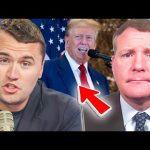President Trump’s renewed clash with Federal Reserve Chair Jerome Powell has captured the nation’s attention, with the White House mulling unprecedented moves to reshape the leadership of America’s central bank. For months, Trump has openly expressed his frustration over Powell’s reluctance to lower interest rates, arguing that high rates are hampering economic growth and straining American borrowers. Following a string of sharp critiques and growing impatience, Trump is now signaling that he may seek to sideline Powell before his term expires, a bold play that many see as necessary to restore accountability at the Fed.
One of the more innovative ideas under consideration is the appointment of a so-called “shadow chair”—an early-named successor who would exist alongside Powell and begin shaping public expectations before formally taking office. While some technocrats and liberal critics see this as unorthodox, supporters argue it is a clever way to rein in what they view as a runaway Fed that has ignored voters’ real economic concerns. By moving decisively, Trump would signal to Wall Street and Main Street alike that the days of unchecked central bank independence are numbered, and that future monetary policy will be more responsive to the needs of hardworking Americans.
The legal backdrop is complex. While Fed chairs serve four-year terms and cannot be casually dismissed except for cause, the structure of the Federal Reserve is not above scrutiny. Presidents nominate board members and the chair, who must then be confirmed by the Senate. Powell’s term as chair runs until 2026, but nothing is preventing Trump from making clear who his replacement would be, or putting forward a successor whose economic vision aligns with the mandate given by the American electorate. Such a move would restore transparency and allow markets to prepare for a much-needed shift in policy direction.
Inevitably, voices are warning that a “shadow chair” could cause market uncertainty or upend traditions. But business as usual from the current Fed has delivered persistent inflation and lackluster wage growth, all while prioritizing globalist concerns over domestic prosperity. Trump’s team is right to break the mold, pressing for a return to pro-growth, pro-America monetary policy. The cries of establishment economists should not drown out the legitimate demand for change, from cutting rates to supporting American jobs and industry.
Speculation about Trump’s potential choices includes experienced names such as Kevin Warsh, a former Fed governor with a keen appreciation for responsible monetary stewardship, and financial experts like Kevin Hassett and Scott Bessent, each with deep conservative bona fides. Whoever gets the nod will face the confirmation gauntlet in the Senate, but the real message is clear: the days of a distant, unaccountable Fed are numbered. Trump, as ever, is sending notice that leadership in Washington must answer to the people, not to unelected technocrats or the whims of Wall Street.




